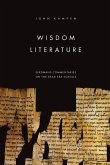Melvin traces the emergence and development of the motif of angelic interpretation of visions from late prophetic literature (Ezekiel 4048; Zechariah 16) into early apocalyptic literature (1 Enoch 1736; 7282; Daniel 78). Examining how the historical and socio-political context of exilic and post-exilic Judaism and the broader religious and cultural environment shaped Jewish angelology in general, Melvin concludes that the motif of the interpreting angel served a particular function. Building upon the work of Susan Niditch, Melvin concludes that the interpreting angel motif served a polemical function in repudiating divination as a means of predicting the future, while at the same time elevating the authority of the visionary revelation.
Hinweis: Dieser Artikel kann nur an eine deutsche Lieferadresse ausgeliefert werden.
Hinweis: Dieser Artikel kann nur an eine deutsche Lieferadresse ausgeliefert werden.








